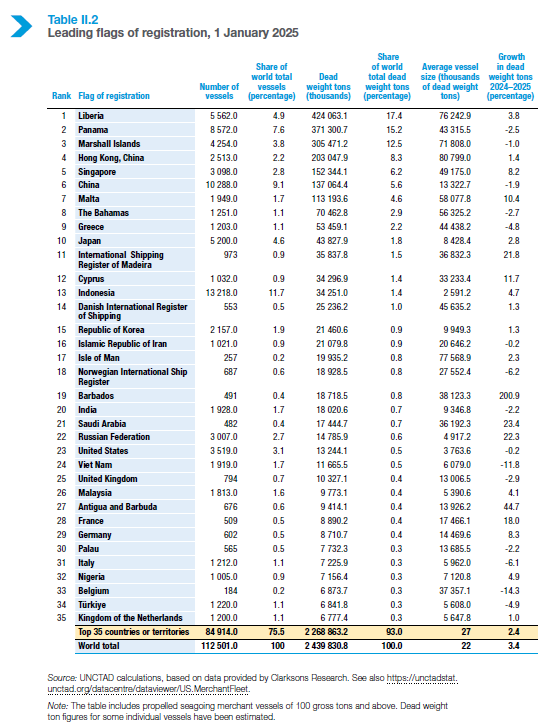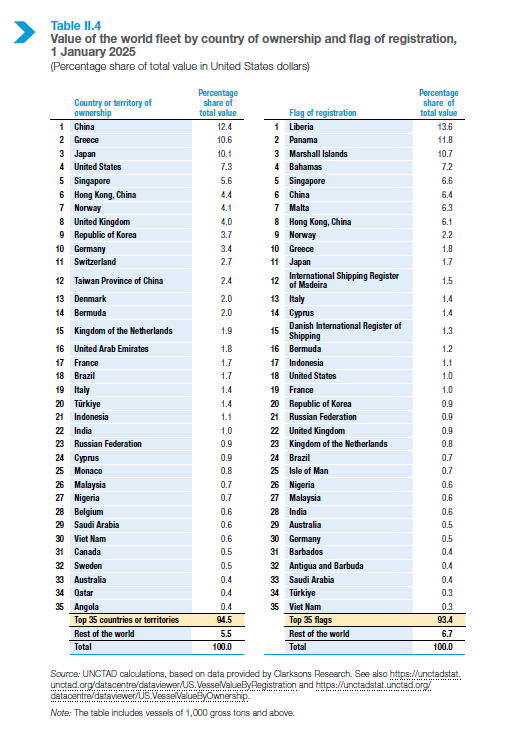In its latest Review of Maritime Transport report, the United Nations Conference on Trade and Development (UNCTAD) presents the list of the world’s top ship owning nations and flag states in 2024.
Top flag states
The list of top shipowning nations and flag countries has remained broadly stable with some shifts in relative rankings. As of 1 January 2025, Liberia, Panama and the Marshall Islands remained the top three flag States, in that order, accounting for 46.5 per cent of total world capacity in dead weight tons, 16.2 per cent of the number of vessels and 36.1 per cent of the global fleet value.
The top 10 flag States accounted for 76.7 per cent of global capacity, 38.9 per cent of the number of vessels and 72.5 per cent of fleet value. Many leading flag States are open registers, meaning they accept foreign-owned ships, have minimal nationality requirements and offer some benefits to shipowners. They include Liberia, which held the first position with a capacity share of 17.4 per cent. Panama ranked second (15.2 per cent) while the Marshall Islands came in third (12.5 per cent). Other ship registers, such as The Bahamas, Cyprus, Malta, Singapore, and Hong Kong, China, are attractive global maritime centres and hubs.
Amid renewed interest in shipping and shipbuilding, the United States is reportedly considering a proposal to create an international shipping registry in the U.S. Virgin Islands as part of efforts to enlarge the commercial shipping fleet flying the American flag. Among the top 10, the Maltese register recorded the largest growth in 2024, increasing by 10.4 per cent. The Bahamas, China, Greece, Marshall Islands and Panama saw small contractions in dead weight ton capacity registered under their flags.

Flag-hopping and the shadow fleet
Flag-hopping accelerated in 2024, with the average time between a ship being hit by sanctions and reflagging falling by half in 2025. Some minor flags have recently experienced rapid growth that is reportedly linked to the “shadow fleet.” This primarily comprises older tankers, including some not inspected recently, with substandard maintenance, unclear ownership and a lack of insurance, operating “to circumvent sanctions and high insurance costs.” In early 2025, the European Union, United Kingdom and United States introduced new sanctions affecting the “shadow” fleet. By May 2025, about 3 per cent of the world’s gross ship tonnage was subject to these sanctions. Together, they could lead to changes in oil trade patterns and demand for tanker capacity, with buyers, especially refiners in Asia, looking for alternative sources, such as in Brazil, the United States and West Africa. Consequently, longer-haul voyages and demand for tanker capacity could increase.
Top ship-owning nations
The top three ship-owning nations by capacity were Greece, China and Japan, in that order, accounting for over 40 per cent of world fleet by dead weight tonnage, nearly one third by vessel count, and 33.1 per cent by value. The combined share of the top 10 ship-owning countries reached 67.3 per cent of global fleet capacity and 65.6 per cent of its value. While Greece was the top ship-owning nation by capacity (16.4 per cent), Chinese owners held the largest share of the global fleet in dollar value (12.4 per cent). The combined shares of China and Hong Kong, China, would move China up to the first position (20.2 per cent) on the list of ship-owning nations globally.

Other notable ship-owning countries
Japan and Singapore, the third and fourth leading global fleet owners, accounted for 9.9 per cent and 6.3 per cent of global capacity, respectively. Much of the capacity owned by the top 10 ship-owning countries is registered under foreign flags, except for Hong Kong, China, for which foreign-flagged ship capacity accounted for less than half of the beneficially owned fleet. European ship-owning nations on the top 10 list, other than Greece, included Germany with a share of 3.0 per cent and the United Kingdom with 2.4 per cent. Countries in Africa and Latin America continue to play minor roles as global shipowners.
Source: Safety4sea






